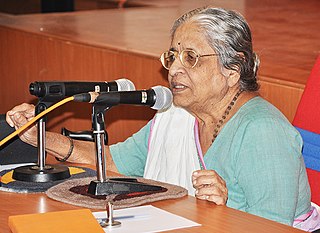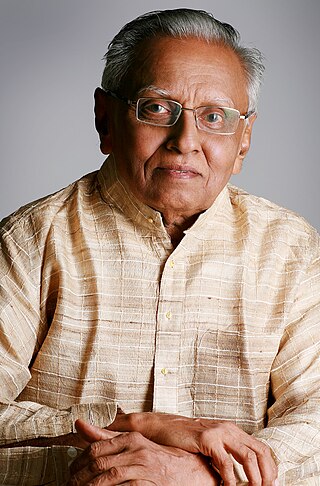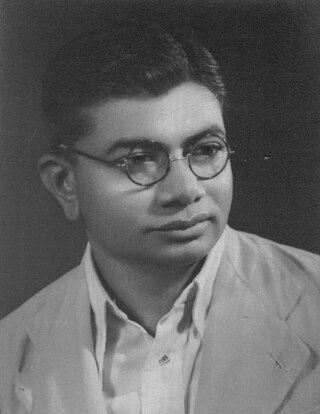
Kathiawar is a peninsula, near the far north of India's west coast, of about 61,000 km2 (23,500 sq mi) bordering the Arabian Sea. It is bounded by the Gulf of Kutch in the northwest and by the Gulf of Khambhat in the east. In the northeast, it is connected to the rest of Gujarat and borders on the low, fertile hinterland of Ahmedabad. It is crossed by two belts of hill country and is drained radially by nine rivers which have little natural flow aside from in monsoon months, thus dams have been built on some of these. Kathiawar ports have been flourishing centres of trade and commerce since at least the 16th century.

Father Peadar Ua Laoghaire or Peadar Ó Laoghaire, also anglicized as Peter O'Leary, was an Irish writer and Catholic priest, who is regarded today as one of the founders of modern literature in Irish.

Kumarpal Balabhai Desai is an author, critic, editor, journalist, columnist and translator from Gujarat, India. He studied and later taught at the Gujarat University. He is associated with several social and Gujarati literary organisations such as Gujarati Sahitya Parishad. He has written and edited more than hundred books including biographies and several works on Jainism. He was awarded the Padma Shri in 2004.

Tarak Janubhai Mehta was an Indian columnist, humourist, writer and playwright who is best known for the column Duniya Ne Undha Chasma, and was a well-known figure in Gujarati theatre.

Jhaverchand or Zaverchand Kalidas Meghani was an Indian Jain poet, writer, social reformer and freedom fighter. He is a well-known name in the field of Gujarati literature. The writer of "mor bani than ghat kare", the most popular Gujarati song. He was born in a Jain family in Chotila where the Government College has been renamed for this literary figure as Raashtreeya Shaayar Zaverchand Meghani College, Chotila. Mahatma Gandhi spontaneously gave him the title of Raashtreeya Shaayar. Besides this he received many awards like Ranjitram Suvarna Chandrak and Mahida Paaritoshik in literature. He authored more than 100 books. His first book was a translation work of Rabindranath Tagore's called Kathaa-u-Kaahinee titled Kurbani Ni Katha which was first published in 1922. He contributed widely to Gujarati folk literature. He went from village to village in search of folk-lores and published them in various volumes of Saurashtra Ni Rasdhar. He was also the Editor of Phulchhab Newspaper of Janmabhoomi group.

Chunilal Madia was a Gujarati author from Gujarat, India, primarily known for his novels and short stories set in rural Saurashtra. Recipients of several awards, he is considered one of the leading writers of Gujarati literature.

Dhiruben Gordhanbhai Patel was an Indian novelist, playwright and translator.

Vibhut Shah is an Indian contemporary Gujarati novelist, playwright and short story writer from India.

Dinkar Joshi is a Gujarati language author from India. He has written more than 160 books including novels, short story collections, essay collections and columns.

Makaji Meghpar is a village and former chiefdom of Hardhrol Jadeja chieftains in the Jamnagar district of Gujarat, India. It was founded in 1754 by Makanji Jadeja of Dhrol State. Gujarati writer Harilal Upadhyay was from the village. The people are mainly Jadeja Rajputs with some Brahmins, Patels and Dalits.

Harshad Trivedi is a Gujarati language poet, short story writer, critic and editor from Gujarat, India. He was an editor of Shabdasrishti, an organ of Gujarat Sahitya Akademi, from 1995 to 2015. Trivedi has served in different positions at several Gujarati literary institutions. As of 2023, he is a president of Gujarati Sahitya Parishad.

The Battle of Bhuchar Mori, also known as Battle of Dhrol, was fought between the army of Kathiawar led by Nawanagar State and the Mughal army at Bhuchar Mori plateau near Dhrol, Saurashtra. It was meant to protect Muzaffar Shah III, the last Sultan of Gujarat Sultanate who had taken asylum under Jam Sataji of Nawanagar after his escape from the Mughal emperor Akbar. It was fought in July 1591. The Kathiawar army included the armies of Junagadh who betrayed Nawanagar and joined the Mughal army at last. The battle led to a large number of casualties on both sides. The battle resulted in the victory of the Mughal army.

Vinod Joshi is an Indian poet, writer and literary critic in Gujarati language from Gujarat, India. His notable works include Parantu, a collection of Geet, Shikhandi, a long narrative poem based on Shikhandi, a character from the Mahābhārata, Radio Natak: Swarup ane Siddhant, Tundil-tundika, a form of padyavarta, a Gujarati medieval literary genre, and Zalar Vage Zoothadi, a collection of poems. He is the recipient of the Jayant Pathak Puraskar (1985), Critic's award (1986), Kavishwar Dalpatram Award (2013), Sahitya Gaurav Puraskar (2015), Narsinh Mehta Award (2018), Kalapi Award (2018), Darshak Sahitya Sanman Award (2021), Narmad Suvarna Chandrak (2022) and Sahitya Akademi Award (2023).
The Children's literature in Gujarati language of India has its roots in traditional folk literature, Puranic literature, epics and fables from Sanskrit literature. Following 1830s, the large number of stories and fables adapted and translated from various traditional and western sources started to appear in Gujarati. Led by Gijubhai Badheka and Nanabhai Bhatt, the children's literature expanded rapidly in form of stories, poems, rhymes and riddles. Several authors and poets wrote for children intermittently and exclusively. Large number of magazines catering to children were published by middle of twentieth century. Later adventure novels, science fiction, young-adult fiction were also published. Ramanlal Soni and Jivram Joshi contributed for five decades creating stories, fictional characters and novels. Few children's plays were published while the biographies of historical characters appeared frequently.

Shrikant Vallabhdas Shah was a Gujarati poet, novelist, short story writer and playwright from Gujarat, India, mainly known for his experimental novel Asti (1966).

Ramnarayan Vishwanath Pathak was a Gujarati poet and writer from India. Profoundly influenced by Gandhian thought, Pathak wrote criticism, poetry, drama, metrics and short stories. He edited and translated literary works. He was appointed the president of Gujarati Sahitya Parishad in 1946. He was awarded the Gujarati literary prizes Narmad Suvarna Chandrak for Prachin Gujarati Chhando in 1949 and Sahitya Akademi Award for Bruhat Pingal in 1956.

Vijay Ramanlal Shastri is an Indian Gujarati language short story writer, novelist, critic and translator. He was educated and worked at the M. T. B. Arts College in Surat and has written more than two hundred short stories in addition to several works of criticism.

Balabhai Virchand Desai, better known by his pen name Jaybhikhkhu, was a Gujarati novelist, short story writer, playwright, essayist, and biographer from Gujarat, India. He is known for his historical novels.
Chandrakant Sangani was an Indian Gujarati language director, writer and actor from Gujarat, who worked predominantly in Gujarati cinema.
Jashwant Thaker was an Indian actor, playwright and director of Gujarati theatre. He directed and acted in several successful plays. He was awarded the Sangeet Natak Akademi Award in 1968, the Ranjitram Suvarna Chandrak in 1977 and the Soviet Land Award in 1986.

















